HubSpot CMS vs WordPress is the most talked about comparison in the content management industry.
So, here is my take on the topic!
In this thorough analysis, we’ll examine the key features and strengths of HubSpot CMS and WordPress, two leading contenders in web management.
We’ll assess both platforms, providing valuable insights and fostering discussions.
Let’s begin.
Now before we get to the detailed discussion, let’s have a quick to-the-point HubSpot CMS vs WordPress comparison in case you’re in a hurry!
Quick rundown of HubSpot CMS vs WordPress comparison
Distinction |
HubSpot |
WordPress |
| Purpose | All-in-one inbound marketing and sales platform | Open-source content management system and website builder |
| Ease of Use | User-friendly with drag-and-drop functionality | Intuitive interface for beginners and advanced users |
| Cost | Premium pricing with various plans | Free to use, additional costs for hosting and extensions |
| Marketing Automation | Extensive features for automated marketing | Limited automation, plugins available for enhancements |
| CRM Integration | Built-in CRM functionality for seamless tracking | Integrates with various CRMs through plugins |
| Customization | Limited customization options | Highly customizable with a vast plugin and theme ecosystem |
| Support and Resources | Extensive support and educational resources | Large community with documentation and online forums |
| Security | High-level security and data protection | Security depends on user’s hosting and plugin choices |
| eCommerce Capabilities | Robust eCommerce features and integrations | Supports eCommerce with plugins and dedicated solutions |
| SEO-friendliness | Optimized for search engines and analytics | SEO-friendly with plugins and tools for optimization |
Now that we have our quick facts sorted, let’s move onto our HubSpot CMS vs WordPress comparison in detail.
HubSpot: The All-in-One Marketing Platform
As a seasoned HubSpot user, you’re already familiar with its powerful features.
Now, imagine unlocking a new realm of marketing excellence with HubSpot CMS.
This game-changing platform seamlessly combines data-driven marketing intelligence and growth-focused design, revolutionizing the way you engage with your audience.
Elevate your campaigns with personalized user experiences that convert like never before.
Experience the limitless possibilities and propel your business to new heights with HubSpot CMS – the perfect companion to maximize your marketing potential and achieve remarkable success.
| Wondering Why Choose HubSpot CMS? Here Is A No-nonsense Guide for you! |
Exploring HubSpot’s key features and functionalities
Explore benefits of HubSpot CMS like marketing automation, CRM integration, content management, email marketing, and analytics.
So, elevate your strategies and achieve success with HubSpot.
1. Marketing Automation
Streamline your marketing efforts with HubSpot’s savvy automation tools.
Make sure to take advantage of automated workflows that guide leads seamlessly through the buyer’s journey, delivering targeted content based on their behavior and preferences.
Schedule and send personalized emails at the perfect time, nurturing relationships effortlessly.
HubSpot’s marketing automation empowers you to save time, enhance efficiency, and watch your conversions soar.
2. CRM Integration
Stay ahead with seamless CRM integration. HubSpot’s platform unifies marketing and sales data, providing a comprehensive view of every customer.
Easily track leads, manage interactions, and nurture relationships within a single system. With shared insights, your sales team gains a deeper understanding of prospects, enabling personalized and effective interactions.
No more silos, just smooth collaboration and a stronger focus on building lasting customer connections.
3. Content Management System (CMS)
No coding? No problem!
HubSpot’s user-friendly CMS lets you create and customize web pages effortlessly. Enjoy a drag-and-drop editor to design stunning sites that reflect your brand’s personality.
Easily add, edit, and manage content, keeping your website fresh and engaging for visitors. With mobile optimization, your site looks and performs flawlessly across all devices, delivering exceptional user experiences that keep audiences coming back for more.
4. Email Marketing
Craft captivating email campaigns that shine.
HubSpot’s intuitive email tools offer a plethora of features to elevate your communication.
Segment your lists based on behavior and preferences, ensuring that your emails reach the right audience with the right message.
Monitor open rates, click-throughs, and engagement metrics with real-time analytics, allowing you to refine your email strategies for maximum impact. Increase conversions and build lasting relationships through targeted and relevant email communication.
5. Analytics and Reporting
Get the full picture with comprehensive analytics and reporting.
HubSpot content management provides in-depth insights into your marketing efforts, enabling you to measure performance, optimize campaigns, and make data-driven decisions. Track key metrics such as website traffic, lead generation, and conversion rates.
Identify trends and patterns, allowing you to refine your strategies for better results. With HubSpot’s analytics and reporting, you can confidently steer your marketing efforts toward continued success and growth.
What makes HubSpot Unique?
Here’s what Coty Perry, Chief Marketing Officer at Anglers.com has to say about it –
If your goal is to have an all-in-one marketing powerhouse then HubSpot content management is your best bet. The depth of their services grows every year and they can basically do whatever you want out-of-the-box.
Want to migrate to HubSpot CMS? Get started now!
HubSpot Migration Services
Pros of using HubSpot
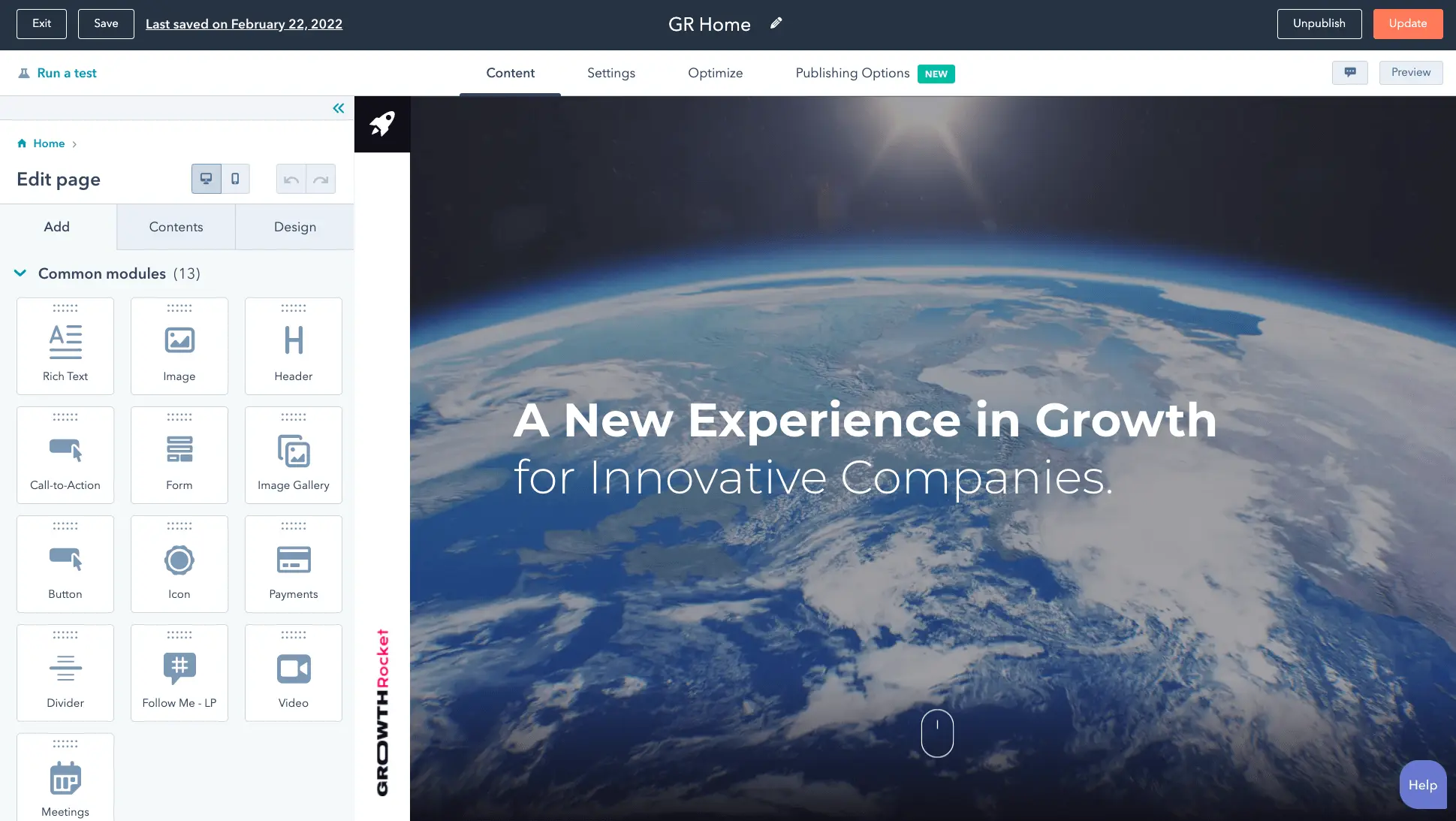
1. Streamlined and unified approach to marketing
HubSpot content management offers a one-stop-shop for all your marketing needs.
With its integrated platform, you can seamlessly manage marketing automation, CRM, email marketing, and more. Say goodbye to scattered tools and enjoy a cohesive strategy that drives exceptional results.
2. User-friendly interface for non-tech-savvy users
No need to be a tech genius!
HubSpot’s intuitive interface makes it easy for anyone to create and manage campaigns. From building web pages to setting up email workflows, the user-friendly platform empowers marketers of all levels.
3. Comprehensive marketing analytics and insights
Knowledge is power!
HubSpot’s robust analytics provides in-depth insights into your marketing efforts. Measure the performance of campaigns, track customer behavior, and make data-driven decisions for continuous improvement.
Cons of using HubSpot
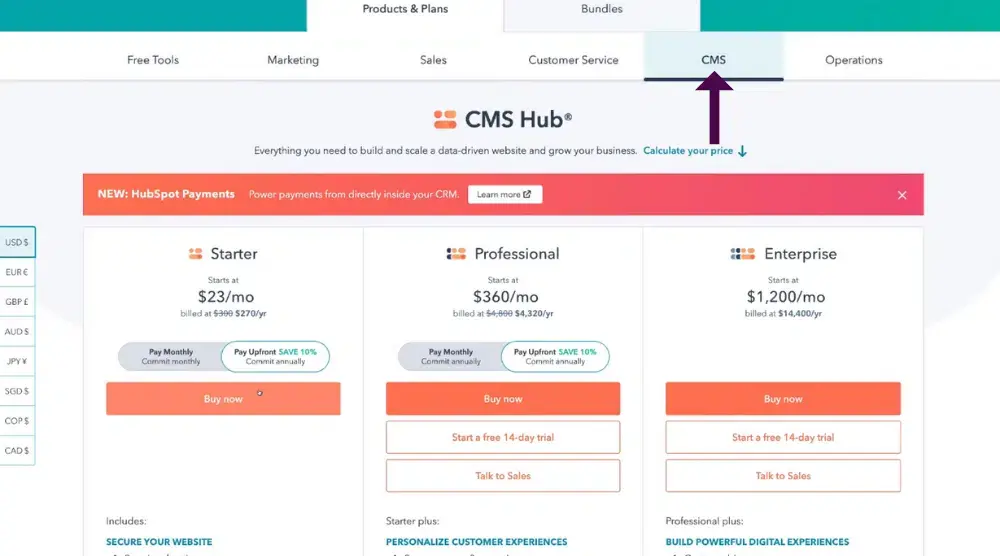
1. Higher cost compared to other platforms
While HubSpot’s features are undeniably powerful, they come at a higher price point than some alternatives. For smaller businesses or those on a tight budget, it may require careful consideration of cost-effectiveness
2. Limited flexibility for advanced customizations
HubSpot’s ease of use comes with some trade-offs. Advanced users seeking highly complex customizations may find certain limitations. Balancing simplicity with customizability is essential to evaluate its fit for your specific needs.
3. Learning curve for new users
With its extensive features and functionalities, HubSpot content management tool can initially be overwhelming for new users. However, the wealth of resources, training, and support provided by HubSpot helps ease the learning process over time.
| Need more pros and cons of using HubSpot CMS for better analysis? We have your back! Here are The Pros And Cons Of Managing Content With HubSpot CMS. |
WordPress: The Versatile Content Management System
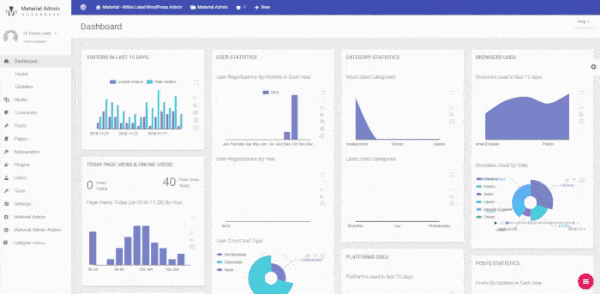
As a leading open-source Content Management System (CMS) and website builder, WordPress revolutionizes the way we create and manage websites.
With its intuitive interface and user-friendly features, WordPress makes website creation accessible to individuals and businesses of all sizes.
Adding to that, the platform’s vast collection of plugins and themes offers unmatched customization possibilities, allowing users to tailor their websites to meet unique needs and preferences. So, whether you’re a blogger, an eCommerce entrepreneur, or a corporate entity, WordPress provides the tools and flexibility to thrive in the digital landscape.
Thanks to its scalable architecture and continuous community support, WordPress remains a trusted choice for millions worldwide.
Unveiling the power of WordPress for website development
Discover the key to website development success with its intuitive interface and vast features.
1. Open-source nature and large community support
WordPress is not just any website builder; it’s an open-source powerhouse that’s backed by a vibrant and passionate community. Moreover, being open-source means it’s free to use and constantly evolving with love from developers, designers, and enthusiasts worldwide.
Above all, this dedicated community ensures regular updates, security patches, and innovative features to keep WordPress at the forefront of website creation.
But that’s not all!
With such a large and supportive community, you’ll find a treasure trove of resources, forums, and documentation to guide you on your website journey.
If you ever hit a roadblock, don’t worry; there’s always someone ready to help you out!
2. Extensive customizable plugin and theme ecosystem
Ready to make your website truly yours?
With WordPress, customization knows no bounds!
It’s like a magical wonderland of plugins and themes, just waiting for you to explore.
The best part? You don’t need to be a coding ninja to bring your wildest website dreams to life!
So, choose from a vast array of plugins to add new features and functionalities with a simple click.
Want to jazz up your website’s appearance? Say no more!
What’s more, the abundance of themes caters to every style and niche, so you can design your site to perfectly match your vision and branding.
Whether you’re a seasoned developer or a non-tech-savvy individual, WordPress empowers you to create a website that shines with your unique personality and purpose. It’s the ultimate playground for customization, and the only limit is your imagination!
3. SEO-friendliness and content optimization
Don’t we all want to charm the search engines and win over more visitors? With WordPress, SEO-friendliness is part of the magic!
Creating SEO-friendly URLs, crafting irresistible meta descriptions, and nailing captivating titles is a breeze. Moreover, WordPress makes it simple, so you can optimize your content without breaking a sweat.
But here’s the real secret sauce: plugins like Yoast SEO!
These superstars take SEO to the next level by providing valuable insights and recommendations to boost your content’s readability and keyword usage. With their help, you’ll effortlessly climb up the search rankings and captivate your audience like never before.
Pros of using WordPress
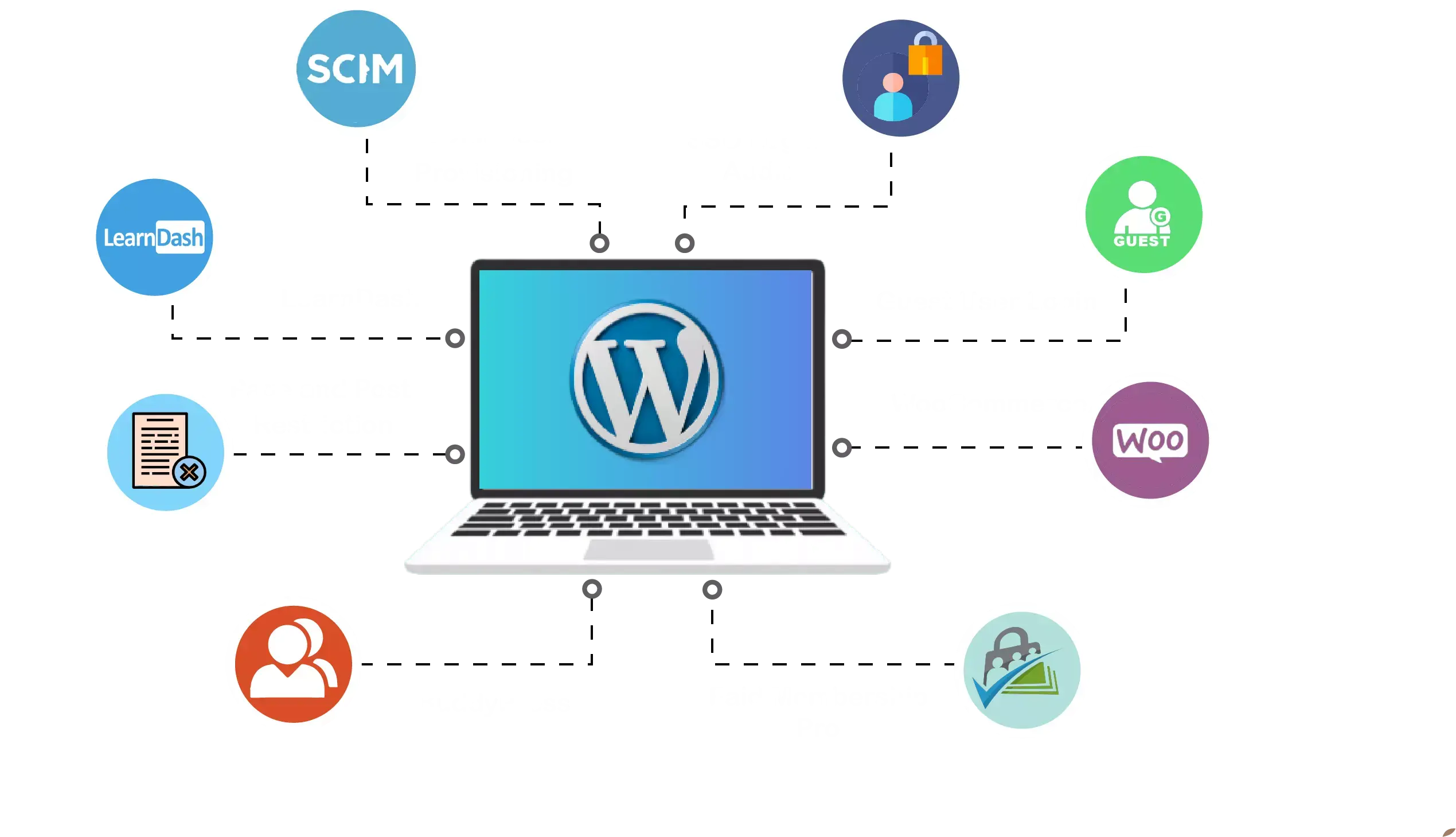
1. Cost-effectiveness and scalability
Who doesn’t love a budget-friendly superstar?
With WordPress, you hit the jackpot!
It’s an open-source delight, meaning it’s free and fabulous. No more breaking the bank on pricey software. Plus, it grows with you like a loyal sidekick.
So, whether you’re starting small or conquering the internet, WordPress scales effortlessly to keep up with your success.
| Also read: HubSpot Pricing Teardown For 2023 |
2. Full control over website design and customization
Say goodbye to boring websites.
WordPress hands you the magic wand of creativity. So, just let your imagination run wild with easy-peasy website design and customization.
No coding sorcery needed!
So, choose from a fantastic selection of themes, layouts, and colors to create a site that screams “You!”
After all, it’s your website kingdom, and you’re the ruler of style and flair!
3. Vast array of integrations and third-party tools
Ever wanted a website that does it all?
WordPress has got your back! Certainly, it’s like a giant treasure chest of integrations and third-party tools, ready to level up your website game.
Furthermore, from email marketing to selling your stuff online, WordPress is the ultimate team player. So, with plugins galore, you can add superpowers to your site and make it shine like a digital superhero.
Cons of using WordPress
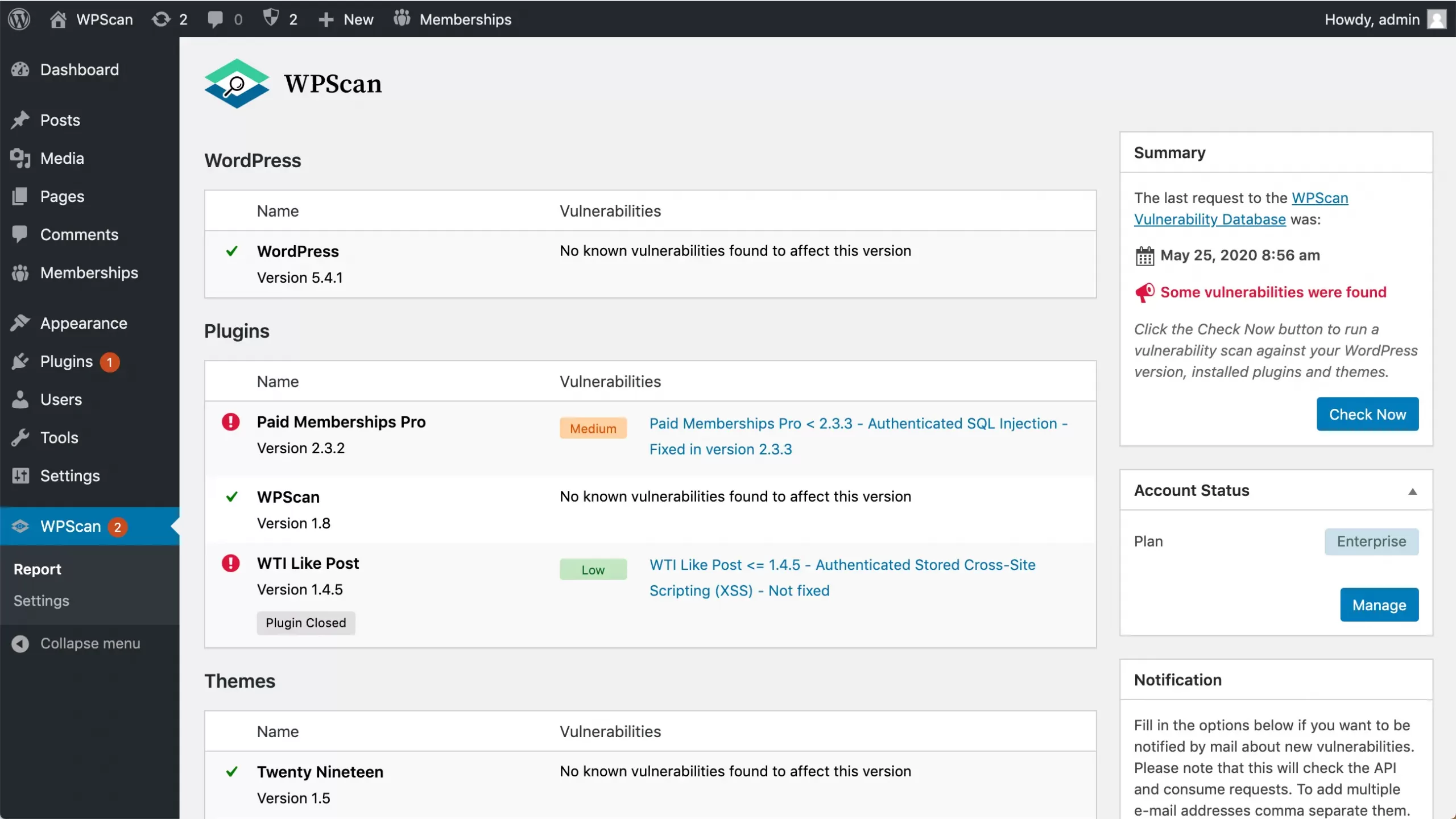
1. Requires regular updates and maintenance
With great websites come great responsibilities!
WordPress is no exception. So, to keep your site running smoothly and securely, regular updates and maintenance are a must.
From plugins to themes and the core software itself, staying up-to-date ensures optimal performance and safeguards against potential issues down the road.
2. Potential security vulnerabilities without proper precautions
As with any popular platform, WordPress can attract the attention of mischievous hackers. Without proper precautions, your site may face security vulnerabilities.
But don’t worry, you’re not defenseless!
Simply, implementing security measures, using trusted plugins, and maintaining strong passwords can fortify your website like a fortress against cyber threats.
3. Content creation and marketing tools may require additional plugins
Looking for the whole shebang in one package?
Some content creation and marketing tools may require extra love in the form of plugins. However, while WordPress has a lot to offer out of the box, specific features like advanced analytics or visual design enhancements might call for additional plugin power.
But hey, with thousands of plugins available, there’s a solution for every need!
HubSpot CMS vs WordPress Comparison and Analysis
Website Development and Design

Website development and design are vital aspects of establishing a strong online presence.
It’s where creativity meets functionality, and two prominent platforms, WordPress and HubSpot, take center stage.
Here’s how HubSpot and WordPress differ from each other in website development.
1. User-friendliness and learning curve
HubSpot prides itself on being an all-in-one platform with a user-friendly interface, making it suitable for marketers and sales professionals. Its guided setup and intuitive tools allow users to get started quickly.
Before you move forward, here are 5 Amazing Website Examples Designed on HubSpot CMS!
On the other hand, WordPress’s simplicity attracts beginners and seasoned developers alike, though it may require some learning for absolute novices. With countless resources and a welcoming community, the learning curve becomes manageable.
2. Design customization options
HubSpot offers a collection of professionally designed templates, making it easy for users to create visually appealing pages without extensive customization. While it may limit design flexibility, it streamlines the process for marketers.
In contrast, WordPress shines with unparalleled design customization. So, with thousands of themes and a vast plugin ecosystem, users can unleash their creativity and design unique websites to perfectly match their brand identity and vision.
3. Mobile responsiveness and performance
HubSpot ensures mobile responsiveness for all its templates, guaranteeing an optimal user experience on various devices. In short, its managed hosting and integrated CDN enhance performance, providing a seamless browsing experience.
In contrast, WordPress’s performance depends on hosting choices and plugin optimization. With the right setup, it can achieve exceptional mobile responsiveness and fast-loading pages, but requires more attention to ensure top-notch performance. Using a provider recommended by Cybernews for the best WordPress hosting can help ensure faster load times and better mobile responsiveness.
Marketing and Lead Generation

When it comes to marketing and lead generation, HubSpot and WordPress offer distinct capabilities. So, let’s differentiate.
1. Automation capabilities
HubSpot excels in marketing automation with its comprehensive set of features. From automated email workflows to lead nurturing, HubSpot streamlines repetitive tasks, saving time and effort.
Its advanced automation empowers marketers to deliver personalized content to leads based on their behavior, maximizing engagement and conversion opportunities.
WordPress, while capable of basic automation through plugins, may require more manual setup. Although it offers plugins for email automation and CRM integration, the scope is not as extensive as HubSpot’s all-in-one marketing automation suite.
2. Lead capture and management
HubSpot takes the lead in capturing and managing leads efficiently. Its built-in forms, pop-ups, and live chat tools simplify lead capture and seamlessly integrate with its CRM.
In other words, marketers can easily track interactions and manage leads within a unified system, fostering stronger customer relationships.
WordPress relies on plugins for lead capture, and while it provides flexibility, managing leads might require additional integrations. Though effective, WordPress may not offer the same level of streamlined lead management as HubSpot’s purpose-built solution.
3. A/B testing and conversion tracking
HubSpot empowers marketers with robust A/B testing capabilities. Moreover, from email subject lines to website content, users can conduct experiments and optimize their marketing efforts based on real data. Its integrated conversion tracking allows in-depth analysis, enabling marketers to measure campaign success and make data-driven decisions.
WordPress, again, offers A/B testing and conversion tracking through plugins. While effective, the variety and depth of testing options may not match HubSpot’s native capabilities. Users might need to explore different plugins for testing and tracking, potentially requiring more effort to achieve comparable insights.
Content Management and SEO
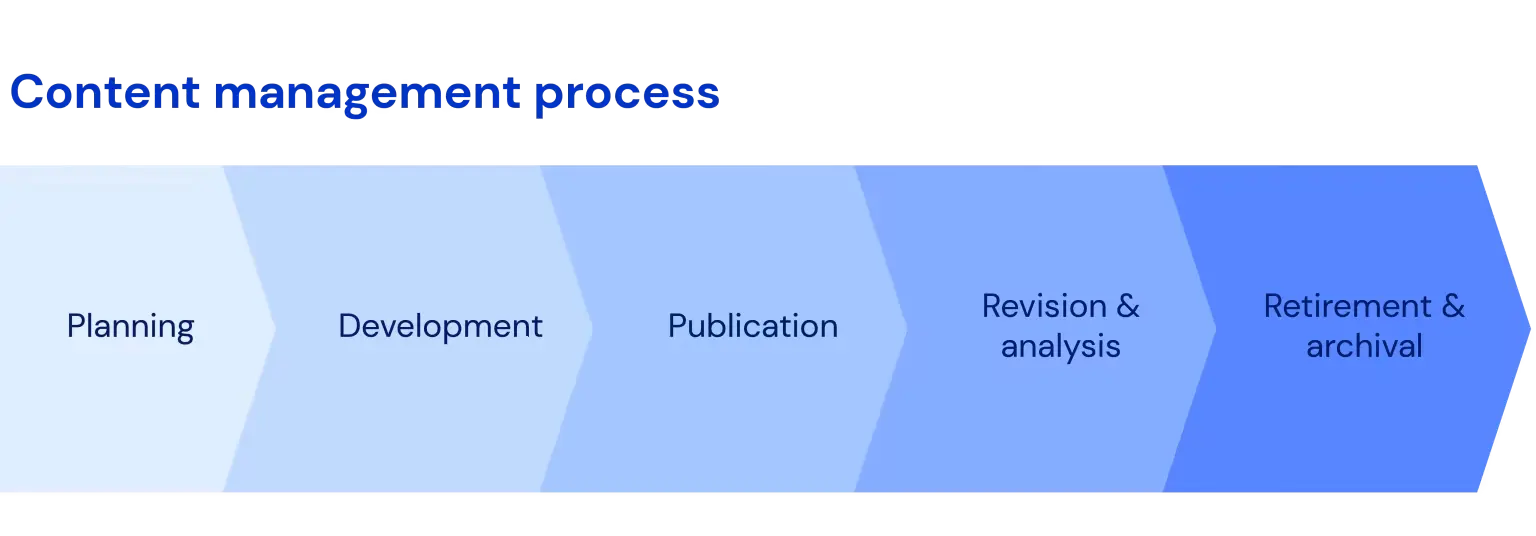
Effectively managing content and optimizing it for search engines is crucial for online success.
So, let’s talk HubSpot vs WordPress in this context.
1. Content creation and organization
HubSpot offers a user-friendly content creation interface, allowing marketers to craft engaging content without the need for technical skills. Its content editor simplifies the process, ensuring seamless organization with categorized folders for easy content management.
However, HubSpot’s focus on marketing might limit the flexibility needed for extensive content creation, particularly for media-rich websites.
WordPress, on the other hand, excels in content creation and organization with its powerful Gutenberg editor. Additionally, it offers more design options and plugin compatibility, making it ideal for diverse content formats.
WordPress’s taxonomy system facilitates robust content organization, making it the go-to choice for content-heavy websites and blogs.
2. SEO optimization features
HubSpot takes pride in its built-in SEO optimization features. Furthermore, it assists marketers in optimizing content for search engines, providing suggestions for meta tags, keywords, and readability.
HubSpot’s integrated content strategy tool empowers users to align content with target keywords, enhancing search rankings.
WordPress, as an open-source platform, provides SEO optimization through various plugins like Yoast SEO and All in One SEO Pack. Moreover, these plugins offer comprehensive insights and recommendations to improve content SEO.
Meanwhile, for users who prioritize SEO customization and fine-tuning, WordPress’s plugin ecosystem offers an edge.
3. Blogging and content scheduling
HubSpot offers a built-in blogging platform that seamlessly integrates with its marketing tools. Moreover, it simplifies content publishing and allows marketers to schedule posts in advance, maintaining a consistent publishing schedule.
However, for bloggers seeking more design flexibility, HubSpot’s predefined templates might feel limiting.
WordPress, renowned for its blogging capabilities, offers unmatched freedom for bloggers. Certainly, its Gutenberg editor and an abundance of blogging plugins enable bloggers to craft visually stunning posts.
As a result, content scheduling in WordPress is equally effortless, with plugins like Editorial Calendar streamlining post planning and publication.
Choosing the Right Platform for Your Needs
When it comes to building your online presence, selecting the right platform between HubSpot CMS and WordPress is crucial.
So, let’s navigate this decision by exploring key factors that will influence your choice.
Identifying your website goals and requirements

Begin by defining your website goals and requirements. Consequently, if you prioritize a seamless integration of marketing tools with content management, HubSpot CMS hub might be the ideal fit.
That is to say, its all-in-one approach streamlines marketing efforts, making it a top choice for businesses seeking a comprehensive solution.
Conversely, if you seek unparalleled design customization and content flexibility, WordPress empowers you with a vast plugin and theme ecosystem, catering to diverse website needs.
Budget considerations and cost analysis
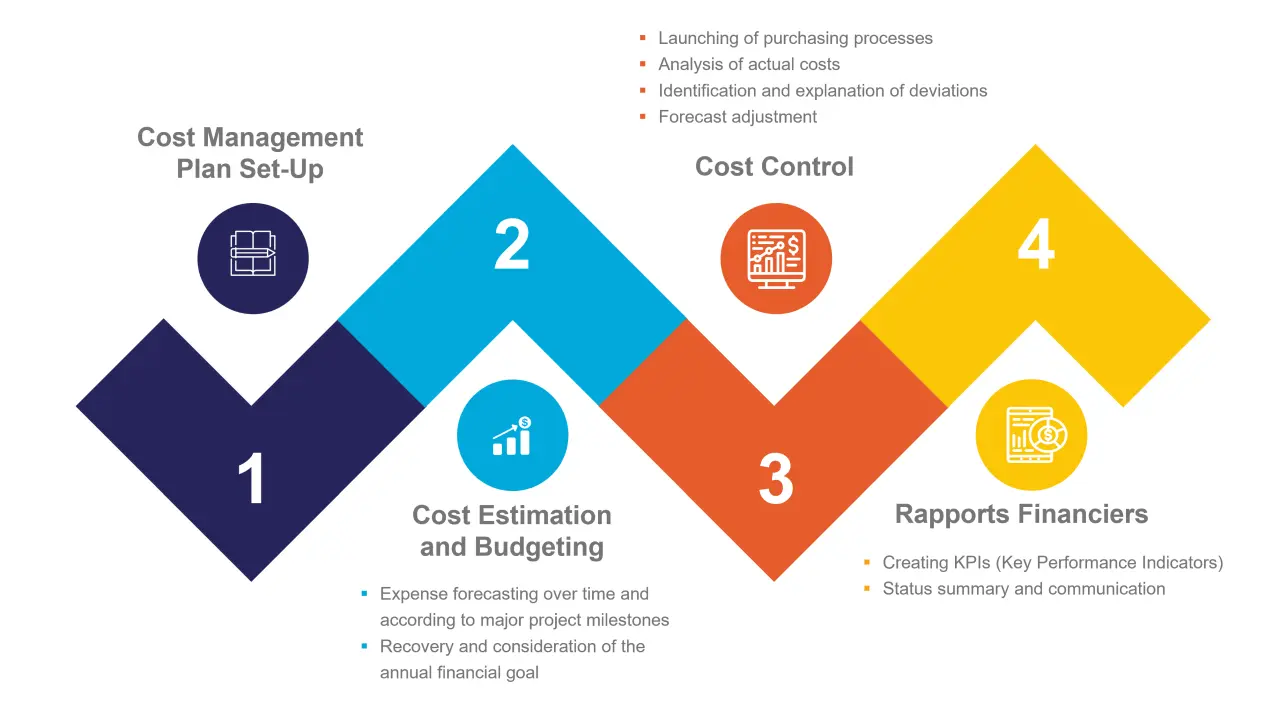
Next, assess your budget and conduct a cost analysis. HubSpot CMS’s premium pricing offers a bundled package of marketing tools, hosting, and support, ideal for businesses seeking a simplified solution.
That is to say, for cost-conscious users, WordPress is a cost-effective alternative, being open-source and free to use. However, consider additional expenses for hosting, premium themes, and plugins based on your website’s specific requirements.
Understanding the importance of marketing and SEO strategy
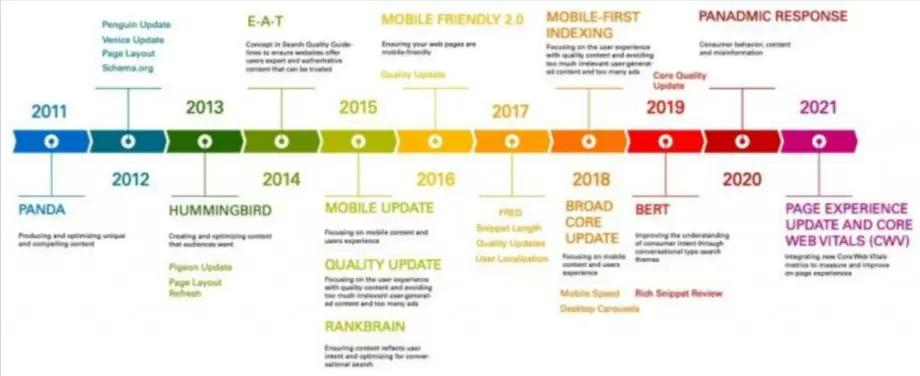
Your marketing and SEO strategy play a pivotal role in choosing the right platform.
To clarify, if your marketing efforts revolve around inbound marketing, lead generation, and sales automation, HubSpot CMS hub offers dedicated features to amplify your strategy.
In contrast, WordPress provides extensive SEO plugins and content optimization tools, offering a customizable approach to meet your unique marketing goals.
| Considering Moving from WordPress to HubSpot CMS? You might need these 7 Steps To Migrate From WordPress To HubSpot. |
HubSpot CMS vs WordPress: Final Verdict
Alright, folks, we’ve explored the showdown between HubSpot CMS hub and WordPress, and it’s been quite compelling!
So, now comes the moment of truth – deciding which platform is your true love for creating an extraordinary online presence!
Is HubSpot better than WordPress? Or whether WordPress takes the cake?
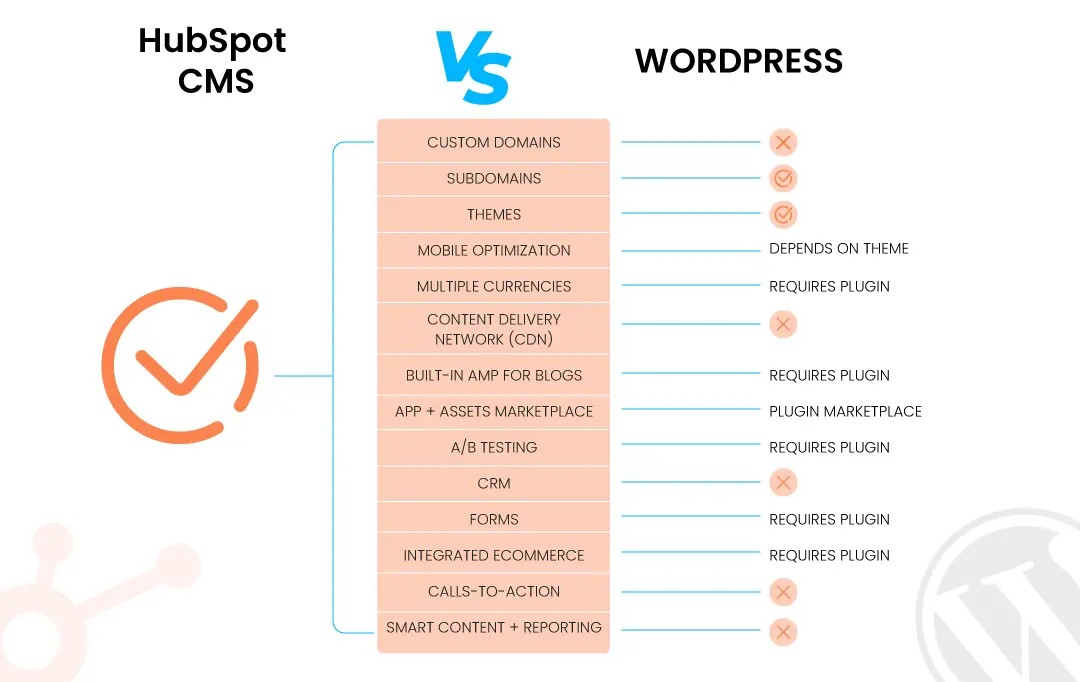
Also remember, it all boils down to understanding what you need and want for your website. Above all, if you crave that all-in-one marketing and content management magic, HubSpot CMS could be your perfect match. It’s like a one-stop-shop, simplifying your life and boosting your marketing prowess!
But hold on a second!
If you’re all about that freedom to customize and design your website like a pro, then WordPress might just steal your heart!
With its plugin and theme playground, you can create a digital wonderland that perfectly aligns with your brand and vision.
Therefore, think about your goals, your budget, and how you plan to conquer the digital realm with your marketing and SEO strategy. Consider the unique strengths of both platforms and how they can help you turn your online dreams into reality.
So, whether you’re Team HubSpot CMS or Team WordPress in the HubSpot CMS vs WordPress showdown, rest assured that both have their special charm and potential.
After all, the right platform is the one that empowers you to shine online and captures the essence of your brand.












This information is really beneficial, not only to myself, but to everyone else living in the information age
Thanks for appreciating our efforts. We have many more comparison articles lined up in the coming weeks, stay tuned!
What is the best method for me if I’m looking for a platform that helps my business grow better?
Is HubSpot CMS really worth a try?
Well, if you’re looking for a more sustainable method to grow your business, my suggestion is to go with HubSpot CMS as it is more secure and flexible than basic WordPress CMS.